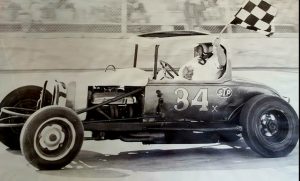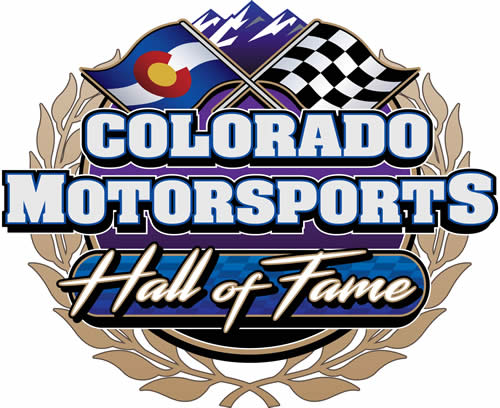Induction Class of 2018
Tom Vanswearingen
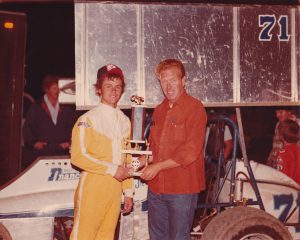 Tom Vanswearingen received a 2018 Jerry Van Dyke Award for contributions made to Colorado Motorsports during his 50 years of involvement in racing as an event announcer, pit steward, and race official for numerous organizations and race tracks.
Tom Vanswearingen received a 2018 Jerry Van Dyke Award for contributions made to Colorado Motorsports during his 50 years of involvement in racing as an event announcer, pit steward, and race official for numerous organizations and race tracks.
Tom was the announcer for the RPM Sprint Car series in the early 70’s, and continued to announce events for Midget, Sprint Car, USAC Silver Crown, and Stock Car racing at tracks throughout the region for over 30 years. Most fans knew him from his work at Lakeside Speedway, Colorado National Speedway, and Rocky Mountain National Speedway, where he worked alongside legendary announcers Jerry Van Dyke, Mitch Miller, and Mark Woodward.
As an event announcer, Tom did far more than simply provide facts. Through his vast knowledge of the sport, his personal interactions with the drivers and teams in competition, and his unforgettable ability to connect with fans and the racing community, Tom was able to provide insights into what was transpiring at the track and create an experience that was unforgettable for fans in the stands. When it came to race day, Tom was always willing to do whatever he could to make and event successful, whether it was in the booth, in the pits, or on the track. Tom would most often be seen before the beginning of these events, interviewing drivers, crews, and officials, looking for bits of information and insight he could pass along to his audience. He was the ultimate friend to the sport: part official, part reporter, always an enthusiastic and knowledgeable promoter of racing.
The Colorado Motorsports Hall of Fame is pleased to recognize Tom Van Swearingen’s lifetime contributions to the sport of auto racing and his passionate dedication to make a days at the races memorable for everyone by awarding the Jerry Van Dyke Award to him as a part of the class of 2018.
Bill Ray
Bill Ray has been selected to receive a Jerry Van Dyke award in recognition of his 57 year career supporting Colorado Motorsports. His interests began watching stock car racing at Macon County Speedway in Decatur, Illinois. After moving to Colorado in 1953, he watched the races at Englewood Speedway until he was old enough to enter the pits. He was introduced to Jim Opperman, and joined his pit crew. Bill eventually bought his own car and competed in the modified division from 1962 to 1978, racing against Joe Lehman, Jim Opperman, Jim Venable, and other notable and stout competitors. While Englewood Speedway remained his favorite track, he also raced at speedways such Lakeside, Colorado Springs, and Pueblo in Colorado, as well as tracks in Benkelman, Nebraska, Cheyenne, Wyoming, and Oklahoma City. He says two memorable events in his career were “getting upside down while running over someone’s tire at Englewood”, and “breaking a steering arm, which led to running into an outhouse in Benkelman”.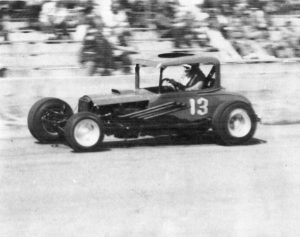
In addition to his time on the track, Bill served as Englewood Racing association president from 1966-1978. He also served as pit steward for a total of 23 years at Englewood Speedway and Colorado National Speedway, during which time he worked for track owners Richard Codner, George Butland, Jim Opperman, and Marshall Chesrown. Bill has said he did his best to run good, fast pit programs at the races, and always tried to be considerate of others. Those who participated in those events know that Bill succeeded in meeting those goals, and were able to depend on him to run things professionally and fairly. Bill Ray earned much praise and respect for his dedication to oval track racing in his long and accomplished career, and his efforts are saluted with the 2018 Jerry Van Dyke Award.
Jeff Walters
Jeff Walters’ career began in 1978 as he raced go-karts in Boulder and Longmont. He graduated to full-sized race cars while competing in the Bomber/Pure Stock class–first at Lakeside Speedway, then at Colorado National Speedway in 1981. As his career progressed, Jeff competed on both dirt and paved oval tracks in five states, racing in the Pure Stock, Sportsman, late model, and most prominently, IMCA modified divisions. His accomplishments include eight track championships, five of which were in the modified division, and the national IMCA Rookie of the Year for the Rocky Mountain Region in 1993. He became the first driver to win track championships in two different IMCA competition regions within two different time zones, with titles at both I-76 Speedway in Fort Morgan, Colorado and Elmwood Park Speedway in Norton, Kansas. In addition to the championships he has earned, Jeff’s racing seasons have been marked with recognition for most quick times, most trophy dashes, most main event wins, as well as best appearing car, Sportsman of the Year, and Perfect Attendance awards given at multiple tracks and by numerous racing associations. He was even dubbed the “Winningest Driver, Ever” at I-76 Speedway as testament to his winning ways.
Jeff Walters enjoyed 36 years of active competition that saw him claim victory in over 300 races. When he arrived at any track, his fellow competitors knew their work was cut out for them. These days, Jeff competes on an occasional basis in IMCA modified races of his choosing, and has restored a modified race car driven in years past by Denver area driver Harry McCool for participation in Vintage racing events. For his lifelong dedication and hard-charging ways, Jeff was proudly welcomed into the Colorado Motorsports Hall of Fame, Class of 2018.
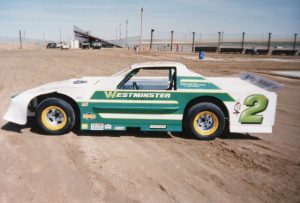
Jim Opperman
Jim Opperman’s racing career began in 1957 at Englewood Speedway, where he competed in the modified division in a car sponsored by The Competitor’s Company, a business Jim owned with his brother Ray. In 1974 he won his first main event and finished the season as the track champion. He moved to the late model division and formed a successful two-car team nicknamed “Papa Opp’s Chevies”, with Jim driving one car, the other driven by his son, Michael. Jim retired from driving with the closing of Englewood Speedway in 1979, but continued as the owner of a team that competed in events around the country, representing Colorado well winning by over 100 events.
Wanting to once again be part of racing at a local track, Jim bought controlling interest in Colorado National Speedway in 1980, and transformed the 1/2 mile dirt configuration to a 3/8 mile asphalt track, building CNS into one of the premier short tracks in the country. Regional pavement track teams were ecstatic, and the transformative efforts Jim and his colleagues invested in the track resulted in a first class racing facility that endures to this day.
Jim Opperman’s career was distinguished by his reputation as a hard-working, clean driver with a strong competitive spirit, as well as a successful businessman who dedicated himself to
the growth and improvement of the sport he loved. For his accomplishments and long standing support of the Colorado Racing community during his 40 year career, Jim Opperman was welcomed into the Colorado Motorsports Hall of Fame, Class of 2018.
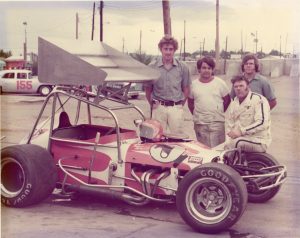
John Metcalf
John Metcalf got his start racing go-karts as an 8 year old against his brother and father in Scottsbluff, Nebraska. He continued to race go-karts until he was 15, when he built a 1955 Chevy stock car the he and his brother raced, winning many races at the local tracks in Gering and Alliance, Nebraska, and Cheyenne, Wyoming. While working at an auto dealership in Scottsbluff,John began building and racing jet boats.
John moved to Colorado in 1974, andwhile he was still racing boats, his passion for stock car racing remained strong. John began working with Late Model racer Mike Bonnicelli, and they built a car they raced in Charlotte, Darlington, and Daytona in NASCAR’s Grand National division. In the mid 1980’s, John built his own late model stock car, and his career as a driver was on. John competed whenever and wherever he could, traveling the western U.S. to compete at tracks throughout the region. In 1989, Mike Opperman asked John to be the crew chief for his race team at the newly-paved Colorado National Speedway. The team was immediately successful, winning the Late Model champion that year. The following year, John drove for Mike and finished second in points for the championship. John then bought Mike’s car, and raced it to numerous main event wins, finishing in the top five in championship points for the next five years.
John again joined forces with Mike Bonnicelli in 1996, and the team won 7 poles and many races. After meeting race team operator and Late Model driver Dave Lineger, John was then asked to run the Team Remax Racing, a position he considered to be a dream come true. From 1997 to 2003, John served in dual roles as team manager and driver, winning Rookie of the year honors in the Southwest Series and finishing 4th championship points in Nascar’s Winston West Series in 2000. In 2001 and 2002, John competedin the national RemaxArca Series. In 2003, the team built a Corvette for road racing. At the 24-hour Rolex race at Daytona they were leading until motor failure forced them out of the race. They went on to win at Watkins Glen and had three podium finishes for the season.
John Retired from racing in 2003 with career statistics of 638 starts, and 116 pole positions. InSouthwest Tour Division, Winston West Series, and Arca Series, John’s raced his way to 204 victories, 376 top 5 finishes, 390 top 10 finishes. Hetied for the Late Model division championship at Colorado National Speedway in 1993, and has one championship as a crew chief to his credit.
After retiring from active competition, Johnstarted C-4HotRods,buildingpremiercarsthathavegainednational exposure, and helped his grandson BrandanwintheColoradoKidKartchampionship,winningall7races in a season. John was inducted into the Colorado Motorsports Hall of Fame as part of the Class of 2018.
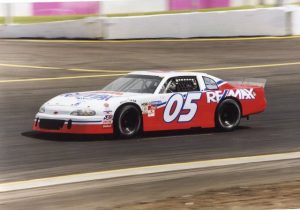
Randy Schranz
Randy Schranz has watched or participated in every Pikes Peak Hill climb since moving to Colorado in 1959. He beganhis racing career in 1967, competing in the Rainbow Falls ice races in a 1955 Jeep pickup and drag racing through the late 1960’s at Continental Divide raceway. After serving as a crew chief for Marv Youngman while competing in the Stock Car class at the Pikes Peak for several years, Randy began his Hillclimb career as a driver in the 4X4 production class, winning the division in a Ford Bronco in 1972 and 1973 while following the path of his favorite drivers, Bobby Unser in the open wheel cars, and Nick Sanborn, Parnelli Jones and Curtis Turner in the stock cars. In 1974, Randy moved to the Stock Car division–the most competitive class at Pikes Peak–and was a consistent top five finisher for more than twenty five years.
In 1999, he broke Roger Mears’ long-standing record for a propane powered vehicle, driving a Chevy Lumina Stock Car up the hill in 12 minutes, 48 seconds. The following year, his team built a Cobra kit car, again powered by propane, to compete in the Exhibition class. He not only set a class record that still stands, but competed for the 14 years with the car, setting standards and exhibiting the strength of propane as a power source. In 2014, members of Randy’s family, as well as friends and fellow members of the Hillclimb community gathered from five different states to celebrate Randy’s 40th, and last run up Pikes Peak.
Today, Randy supports his son’s racing career as he reflects on his own accomplishments that include winning ten times in five different Hillclimb classes over a 40 year competitive career, and appreciating the friends and professional relationships formed through his commitment to Hill Climb racing. For his dedication and outstanding career, Randy Schranz was inducted into the Colorado Motorsports Hall of Fame with the Class of 2018.
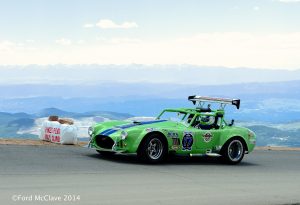
Ricky Orlando
In 1975, after a few high school friends who were involved with motorcycle racing talked him into giving it a try, Ricky Orlando started his racing career in South Florida at the Moroso Raceway in West Palm Beach. He moved to Colorado the next year, and began competing locally in the MRA. In 1983, Ricky moved to the pro level, racing in the AMA Superbike series, and his first attempt at the prestigious Daytona 200 resulted in a seventh place finish. He raced in those early years alongside some of the greatest riders of the eighties–Kenny Roberts, who in the view of many put motorcycle roadracing on the map; Wayne Rainy, Wes Cooley, Freddy Spencer, Fred Merkel all became the competition.
Over a long and accomplished career, Ricky’s most memorable races include the 8 hour World Endurance Championship in Suzuka, Japan, where he finished seventh. Among his best finishes in the US were third place in the 1987 Laguna Seca 600 Supersport race, and third place in a Formula 1 AMA national at Mid-Ohio in 1984. He also finished sixth in the 2004 Daytona 200, and held the mileage record for that race during the AMA pro national series. His career led him to races across the U.S, as well as England, Japan and Macau, with his favorite track–by far–being Barber Motorsports Park in Birmingham, Alabama. Ricky also continued to compete in the Daytona 200, and in 2011, he broke the all-time record for laps completed.
Ricky continues to compete on the regional level in the MRA. He won State Championships in 2001, 2003, 2007, and 2009, along with approximately 75 class championships.
He cites a 2001 Suzuki GSXR 1000, on which he won the MRA State Championship, as one of his favorite rides, and is quick to credit those who have helped him along the way. “Over the years I’ve had a few different tuners. The first year I went pro, Dennis Zickrick built my bike. As I returned to doing more Colorado races, the Cycles of Boulder crew supported me. James Minert also played a big part in helping. Since 1995 Marvin Rosencrans and been with me, Pete Brandauer came onboard a few years ago, and Rocky Mountain Kawasaki, Arai Helmets, EBC Brakes, and Hindle Exhaust have all been along for the ride with their generous support”.
Being a smooth and consistent rider has, no doubt, contributed to the longevity of Ricky’s career and made him standout among other racers. Over the years, he has always helped other racers at the track, or with his venture in the Ricky Orlando Motorcycle School. “Being a rider coach is certainly something that I have been doing to give back to the sport throughout most of my career. It’s great when you take a hobby and turn it into a profession and it stays your passion.”
In recognition of his long and accomplished motorcycle racing career, Ricky Orlando was inducted into the Colorado Motorsports Hall of Fame in 2018.
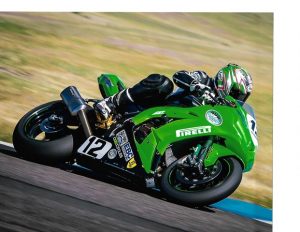
Rob Williams
Rob “Robby” Williams grew up on a farm in Keenesberg, Colorado, surrounded by mechanical devices and people who knew how to work on them. At age 12, his grandfather gave him a twin-engine go-kart; at age 14 he purchased a Harley Davidson Super 10 motorcycle, from which he graduated to the Harley Sportster that became his first drag racing vehicle.
Rob was hired by IBM as a machinist after he graduated from high school in 1965. He also worked part-time at Seyfer Engineering in Arvada, and the extra money in his pocket meant money for racing. He saw a 1966 Dodge Coronet 426 Street Hemi advertised in a magazine and rushed to a Denver dealer. “They’d never heard of the car. They scratched their heads and looked at each other. I was just young kid, but suddenly I was the expert.”
He ordered the car and took delivery, but only drove it a few times at the track before he flattened the cam. The Coronet wasn’t fast enough, so in 1968, he bought a dragster chassis from Dan Widener in Colorado Springs and dropped in the 426 Hemi to run as an A-fuel dragster. Next came the blower from “Doc” Shaddock’s old car, and Rob was in an AA-top fuel dragster. Racing with the support of his younger brother Rex and high school friends Kenny Bollers and Duane Koons, Rob had enough success to order a brand new chassis from builder Mark Williams.
Rob was racing Colorado tracks like Continental Divide Raceway, Mountain View, Thunder Road and Century 21, and regionally at tracks from Salt Lake City, Utah, to Liberal, Kansas. He was winning events and setting track records, and doing well enough to be invited to the NHRA World Finals at Amarillo. By 1972, he was looking at top-fuel funny cars because he figured, “That’s where the money was.”
His next purchase was Don Hardy’s Barracuda, beautifully repainted by Ron Avers as the Williams Brothers funny car. “Bit by bit, there was less left of the original 426 Hemi,” Rob remembers, “until finally it was just the block and the heads. I was running 100% nitro methane in those days, but only because I didn’t have a hydrometer to calculate a mixture. I was just running fuel straight out of the barrel.” The ‘Cuda became a fixture at match races and points events, and took Rob back to the NHRA World Finals before being replaced by Ed Bowen’s Vega in 1974, that had Rob’s name alone on the side.
It was getting harder to keep a crew together, and to stay in racing Rob found himself sometimes driving for other car owners or working as part of the crew on someone else’s car. One of the men he crewed for was Roger Guzman, who had become legendary in the region for his series of funny cars named Assassination. When Ron Kershal asked Roger how to make his Monza “Super Rat” funny car more successful, Roger’s recommendations were to replace the Chevy engine with a Dodge, and replace the driver with Rob Williams. The new combination was a winner, and by mid-season 1977, the Super Rat/Assassination had clinched the Division 5 championship.
For the next season, Guzman unveiled the first of the series of beautiful Dodge cars that would burn themselves into the memories of race fans from Indianapolis to Pomona. Build by Pat Foster and Jim Hume side by side with Don Prudhomme’s car, Assassination became nearly unstoppable in NHRA’s Division 5. Young men such as Steve McClean, Ron Roybal, Alex Vigil, and Bobby Etter volunteered their time to be the crew. Rob and Roger would trailer the car to tracks throughout the region, driving back to Denver in time for work at IBM on Monday.
In the following years, the duo won more NHRA Division 5 championships, along with numerous awards for Best Appearing Crew, Best Appearing Car, Best Engineered Car, and Guzman was named NHRA’s “Person of the Year” in 1979. Top competitors coming to Denver had to worry about more than just the altitude. The Assassination team of Guzman and Williams became known as spoilers as they went up against the likes of Bernstein,Prudhomme, McEwan, Force and Beadle. In 1981, Rob drove to a new funny car record of 247.94mph, and no one who saw the 1980 Mile High Nationals final run of Raymond Beadle in the Blue Max (taking low ET of the meet of 6.19 at 234 mph to beat Williams’ 6.21-233.76) has ever forgotten it. Rob, Roger and Assassination had become such favorites, the crowd actually booed Beadle for two minutes after his win.
There were hard times, too, of course. Blown engines, fires, and crashes cost money. It was hard to compete against well-financed teams with multiple engines and bodies who could have cars shipped to every event. After a devastating crash near the end of 1983, Guzman and Williams parted ways.
Rob’s commitment to racing was too great to simply let it go, and he continued to compete in snow-mobiles and go-karts, and he was active in the IKAC for many years. He worked with Mike Sandberg of Valley Kart Engineering, where he designed and machined parts, built engines and put together winning karting packages for clients. His own competitive activities eventually gave way to administration of the kart club and meets, as well as the design and establishment of a new track that is still running today. As pleased as he was with his own considerable achievements in karting, Rob was more proud of being the tuner in his daughter Brenda’s drive to a championship. Although he never drag raced again, Rob was active in the inauguration of Junior Drag Racing in Colorado, building engines and mentoring young drivers.
These days, Rob’s time is still occupied by racing, but now the venue is the Bonneville Salt Flats and the vehicles are motorcycles. Rob has himself ridden at more than 175 mph, and he has built motorcycles that have taken multiple national and international records, all of them running on (what else?) nitro methane. With the help of his friend Randy Miller, his wife (and fellow rider and record-holder) Julianna, and brother Rex Williams, Rob now heads team Big Bad Nitro Daddy. The mystique of nitro methane sets Rob’s racing efforts apart from most of his racing associates at the Salt Flats.
Looking back, Rob sees the years with Roger Guzman and Assassination as the pinnacle of his career. He was ranked as Fifth and Ninth best driver in the world by the NHRA in 1977 and 1980, but he was always an integral part of the team, and did whatever needed to be done in addition to driving to contribute to their effort. “Roger was a perfectionist,” Rob says, “and I always felt safe in his cars. They were the best tuned, the best set up cars at the track. He never scrimped or cut corners. Other teams would go through Assassination’s trash to get parts to use on their cars.
“We ran a professional team on an amateur budget. No team coming up against us ever took us for granted. We had the potential to win every run at every event.”
Rob Williams outstanding career in drag racing has earned him a place in the Colorado Motorsports Hall of Fame, class of 2018.
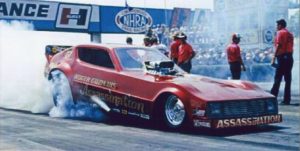
Rod Guilford
Rod Guilford has enjoyed a long and successful career as a drag racer, competing in NHRA events in Colorado and many other states. He has also been a successful car owner/engine builder and crew chief for numerous drag racing and circle track racing teams, winning at the local, regional and national level from 1961 through 1991.
He won his first NHRA class trophy at age 17, driving a 1950 Olds to victory at Cheyenne Dragway in Cheyenne, Wyoming. In 1969, he was given the opportunity to prepare and race a Mercury Cougar provided by the Ford Motor Company for Stock division competition in the NHRA while working for Kenz and Leslie, and the following year prepared and raced a 1970 Mercury Cyclone in NHRA Stock and Super Stock competition, driving for the Kumpf Lincoln-Mercury dealership. Over the next 42 years, Rod set 13 national NHRA records, and ran in 15 divisional final rounds, with seven division championships to his credit. As engine builder or crew chief, he won a NHRA National Stock Points Championship, as well as numerous NHRA Division 5 titles.Over the next 42 years, Rod drove to seven division championships and was runner up in eight more. As engine builder or crew chief, he has 13 championships to his credit, as well as multiple NHRA Division 5 titles. He has also been active as a crew chief in circle-track competition, with six Colorado Auto Racing Club championships, one Pro Truck championship, two Colorado National Speedway Challenge Cup titles and two CNS track championships to his credit.
Rod Guilford has enjoyed success at some of the highest level of competition in multiple racing divisions in Colorado, and is a richly deserving inductee into the Colorado Motorsports Hall of Fame, Class of 2018.
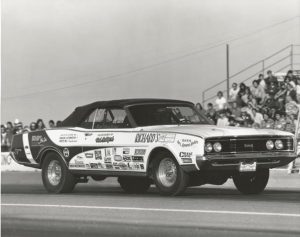
Ron Berry
Cars and racing were a big part of Ron Berry’s early life, as his dad sponsored a race car at an oval track in Montrose, Colorado. Ron started driving at age 7, and built his first motor at age 13. He began racing in the 1950’s, when he first drove a V-8/60 midget at Hotchkiss Fairgrounds, then moved to a 1939 Ford Stock Car to compete on tracks on the western slope of Colorado.
Ron’s racing career accelerated with a move to Grand Junction in 1965, and he became a regular at Cactus Park Speedway in Grand Junction. He also raced and held track records at speedways in Delta and Montrose, Colorado, as well as Moab, Utah. Ron started Drag Racing in 1966, and for most of his active career he ran a weekly schedule of stock car racing on Saturday and drag racing on Sunday, adding Hillclimb to the mix for two years in the early 1970’s. On the drag racing side, he enjoyed much success driving a Hemi Charger, and was undefeated in the Super Stock Auto class for several years. A career highlight was made when he went up against Ford factory driver Ed Terry in a match race and won 3 of 5 passes. On the oval track side, Ron drove to 99 main event wins and track championships at Cactus Park Speedway in Grand Junction in 1969 and 1970.
Ron’s driving career came to a close when his son, Jeep Berry, began his own dirt-track late model career and Ron assumed the role of crew chief. These days, Ron is still in the pits when Jeep is behind the wheel, and is there to lend a hand with his grandson Dakota Berry’s blossoming career in the late models as well.
Ron Berry was known as a racer who was a hard charger, but raced clean and beat some well-known competitors on the track. The Colorado Motorsports Hall of Fame is proud to include Ron in the Class of 2018! Ron Berry passed away in the Fall of 2020.
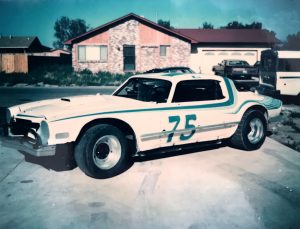
Tony Rossi
Tony Rossi’s introduction to auto racing, as was the case with many north Denver kids, involved going to Lakeside Speedway with his dad, who also took him races at Century 21 Speedway and USAC national shows in Colorado Springs. From the start, the midgets were Tony’s favorite form of racing. Young Tony was inspired by early racing heros such as Grier Manning and Eddie Jackson, and he knew from the start that there was no help for being hooked on racing.
As soon as he could, he began his racing career by competing in the Minisprint division at Second Creek Raceway, eventually driving to a Colorado Mini Sprint Association championship. While the Minisprints were an affordable racing class, Tony had his heart set on racing midgets as soon as he could.
Once he had worked his way up to the midget division, Tony raced his way to an accomplished career. He competed at events in nine states, including National events such as the prestigious Belleville Midget Nationals and the Chili Bowl classic in Tulsa, Oklahoma. In Rocky Mountain Midget Racing Association competition, he was the 1999 Rookie of the Year, and went on to four season championships and numerous main event, heat, and quick time wins in more than two decades of competition. He also won two Curt Stockwell Sportsmanship Awards and seven perfect attendance awards with the club, and served as its president and board of director member for many years.
Tony has said that every time he’s gone to the race track is a dream come true, that racing is an honor, and every time tightening the belts is a blessing.
For his racing accomplishments, as well as his dedication and contributions to Colorado Motorsports, Tony Rossi was inducted into the Colorado Motorsports Hall of Fame in 2018.
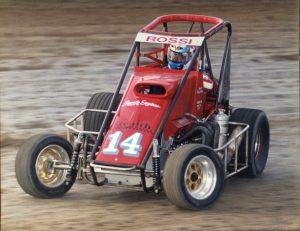
Walt Pickard
Walt Pickard’s motorsports career involved racing at southern Colorado oval tracks, where he compiled 112 main event wins over 17 years of competition. Born in 1932, Walt grew up with a love of all sports, playing on teams in football, baseball, and wrestling that won several championships. His racing career began in 1957, when he drove a race car on a dare from friends Bob Hull and Wade Watts. From that point until 1972, Walt was a competitor in the modified division, winning four track championships at Pueblo Speedway, and setting a track record that still stands by winning ten events in one night at Beacon Hill Speedway. While Walt drove for Wade Watts, Charlie Shepherd, Charlie Simpson, and Otis Roberts in the early years of his career, Walt enjoyed a close friendship with Roger Nelson and drove his red #34 coupe for the bulk of his competitive days. The majority of wins and championships in Walt’s record were wonin partnership with Roger and the Nelson family.Highlights from his early racing days include competing against Bobby and Al Unser at the Colorado State Fairgrounds, and qualifying fifth at the Hutchinson Nationals in Kansas while driving the only six-cylinder powered car against 120 V-8 powered entries.
Walt and Marion Pickard began managing Beacon Hill Speedway in 1970, and purchased the track in 1972. Along with Mike Bonicelli and Rich Codner, Walt played a key role in forming the Olympia Challenge Cup Late Model racing series that brought some of the premier drivers from the across the nation to the track.Walt’s legacy as a promoter also included dirt track auto racing on the 1/2 mile track at the Colorado State Fairgrounds from 1972 through the 1974 seasons, as well as running the race program at Raceway Park in Colorado Springs for the 1974 season
Walt Pickard enjoyed success at many levels in his career as a driver, track owner, and race promoter. He is a richly deserving inductee into the Colorado Motorsports Hall of Fame, Class of 2018. Walt passed away in October, 2020.
